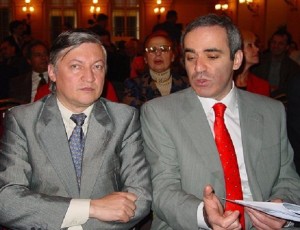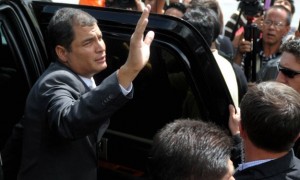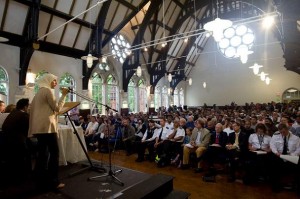October, 2010
Arts & Culture, New in Ceasefire - Friday, October 8, 2010 4:43 - 9 Comments
World Briefing Kashmir: the occupation the world forgot

When searching for items on Kashmir in her local library, Zainab Daniju got more results for a song by Led Zeppellin than for the region itself. Yet this country, under continuous brutal oppression since 1989, is virtually absent from mainstream media coverage. In her piece, Daniju explores the roots of the conflict, as well as the reasons why the world should start caring.
Chess Corner, New in Ceasefire - Thursday, October 7, 2010 12:00 - 6 Comments
Chess Corner: The eccentric, ruthless despot who controls chess
 Kirsan Ilyumzhinov is the ruling dictator of a former Soviet republic, a multimillionaire businessman, and a self-declared alien-abductee. He is also the chess world's biggest patron. This week, after a fraught and bitterly contested campaign, he was re-elected as president of the World Chess Federation. Paul Lam examines the dark, surreal saga of Kirsan's rule.
Kirsan Ilyumzhinov is the ruling dictator of a former Soviet republic, a multimillionaire businessman, and a self-declared alien-abductee. He is also the chess world's biggest patron. This week, after a fraught and bitterly contested campaign, he was re-elected as president of the World Chess Federation. Paul Lam examines the dark, surreal saga of Kirsan's rule.
New in Ceasefire, Politics - Thursday, October 7, 2010 4:25 - 2 Comments
Special Report – N. Korea: The kid who would be king
 A few days ago, an obscure 27-year old was announced as the soon-to-be leader of North Korea, the country with the fourth largest army in the world. A succession process shrouded in mystery and speculation has left many asking whether the regime will be able to survive. In an exclusive special report, Peter Ward, Ceasefire's Korea correspondent, shows that however decried and derided the regime might be publicly, Western governments are tacitly hoping for its survival.
A few days ago, an obscure 27-year old was announced as the soon-to-be leader of North Korea, the country with the fourth largest army in the world. A succession process shrouded in mystery and speculation has left many asking whether the regime will be able to survive. In an exclusive special report, Peter Ward, Ceasefire's Korea correspondent, shows that however decried and derided the regime might be publicly, Western governments are tacitly hoping for its survival.
Diary of a Domestic Extremist, Ideas, New in Ceasefire - Wednesday, October 6, 2010 2:00 - 49 Comments
Diary of a Domestic Extremist: Why I hate activism
 What does it really mean to be an "activist"? Are activists deluding themselves about being agents of radical change? In an impassioned polemic, Mikhail Goldman argues that today's activist movements, far from being the creative, truly revolutionary wave they purport to be, risk becoming, themselves, agents of bigotry, sexism, and elitism.
What does it really mean to be an "activist"? Are activists deluding themselves about being agents of radical change? In an impassioned polemic, Mikhail Goldman argues that today's activist movements, far from being the creative, truly revolutionary wave they purport to be, risk becoming, themselves, agents of bigotry, sexism, and elitism.
Columns, Modern Times, New in Ceasefire - Tuesday, October 5, 2010 5:14 - 1 Comment
Modern Times: WAR.com
 You might not have realised it, but the world is at war. Not a war of tanks and guns, but one of espionage and government-sponsored, carefully buried paper trails. From computer viruses targeting Iran's nuclear sites, to cyber attacks against the banking systems of entire nations, Corin Faife examines, in this week's Modern Times column, a crackling, effervescent yet invisible frontline.
You might not have realised it, but the world is at war. Not a war of tanks and guns, but one of espionage and government-sponsored, carefully buried paper trails. From computer viruses targeting Iran's nuclear sites, to cyber attacks against the banking systems of entire nations, Corin Faife examines, in this week's Modern Times column, a crackling, effervescent yet invisible frontline.
New in Ceasefire, Politics, South of The Border - Monday, October 4, 2010 0:00 - 1 Comment
South of The Border: The view from Latin America
 In the news this week in Latin America: Correa fights back in Ecuador, Presidential elections in Brazil, Chavez retains a majority, and US crimes in Guatemala exposed. Ceasefire correspondent Tom Kavanagh delivers his weekly round up of what's been going on south of the border.
In the news this week in Latin America: Correa fights back in Ecuador, Presidential elections in Brazil, Chavez retains a majority, and US crimes in Guatemala exposed. Ceasefire correspondent Tom Kavanagh delivers his weekly round up of what's been going on south of the border.
CounterSpin, New in Ceasefire - Sunday, October 3, 2010 0:15 - 1 Comment
CounterSpin – Quality Control: Why ‘great’ (media) minds think alike
 From the “Muslim plot against the pope" that never was to “Red Ed” Miliband’s victory, Musab Younis shows, in this week's CounterSpin column, how the media industry systemically enforces conformity within its ranks. Indeed, a journalist’s route to success, Younis argues, is not merely a readiness to obey orders, but the hard-earned discipline not to need them at all.
From the “Muslim plot against the pope" that never was to “Red Ed” Miliband’s victory, Musab Younis shows, in this week's CounterSpin column, how the media industry systemically enforces conformity within its ranks. Indeed, a journalist’s route to success, Younis argues, is not merely a readiness to obey orders, but the hard-earned discipline not to need them at all.
Columns, New in Ceasefire, Sabir on Security - Friday, October 1, 2010 0:30 - 2 Comments
Sabir on Security">You can spy on me or you can ask for my trust, but not both Sabir on Security
 In 2007, the police installed a network of cameras around specific Birmingham areas. This was, they claimed, in order to fight against crimes such as drug-dealing. As the publication of a governmental report confirmed yesterday, they lied. The cameras were used to spy on an entire community. In this week's On Security column, Rizwaan Sabir examines an extraordinary story of cynicism and incompetence.
In 2007, the police installed a network of cameras around specific Birmingham areas. This was, they claimed, in order to fight against crimes such as drug-dealing. As the publication of a governmental report confirmed yesterday, they lied. The cameras were used to spy on an entire community. In this week's On Security column, Rizwaan Sabir examines an extraordinary story of cynicism and incompetence.

